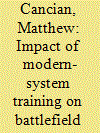| Srl | Item |
| 1 |
ID:
186817


|
|
|
|
|
| Summary/Abstract |
What drives soldiers to risk death on the battlefield? Scholars have suggested that battlefield participation is driven by ideology, coercion, and cohesion while overlooking the importance of confidence in tactical success. On contemporary battlefields, training in effective, modern-system tactics will increase initial confidence and create a positive feedback loop of battlefield participation and combat effectiveness. I test this theory through the as-if random assignment of Peshmerga (Kurdish soldiers) to modern-system training by Western countries. One third of the Peshmerga had no formal training, one third had non–modern-system training from other Peshmerga, and one third had been trained in the modern-system. While non–modern-system training slightly increased unit confidence, it did not impact battlefield participation; coalition training in modern-system tactics dramatically increased confidence and, more importantly, led to higher levels of self-reported battlefield participation
|
|
|
|
|
|
|
|
|
|
|
|
|
|
|
|
| 2 |
ID:
188711


|
|
|
|
|
| Summary/Abstract |
While states and non-state armed groups often engage in militarised conflict over contested territory, at other times they co-govern in a tenuous equilibrium. Using a survey of over 1,600 Kurdish soldiers (Peshmerga) and elite interviews, we investigate local variation in shared governance in one such context – the disputed territories of northern Iraq. Despite the area being under Kurdish military control, the Iraqi government continued to provide services in districts where it had pre-existing infrastructural capacity. However, in revenue-producing districts, Kurdish actors appropriated infrastructural power to provide services themselves. This illustrates that non-state governance strategies, and their outputs, can vary locally.
|
|
|
|
|
|
|
|
|
|
|
|
|
|
|
|
| 3 |
ID:
188790


|
|
|
|
|
| Summary/Abstract |
Although humans have voluntarily joined militaries throughout history, research on the motivation to enlist has increased dramatically since the adoption of the All-Volunteer Force in the United States. Moskos categorized the motivations to enlist as institutional (the value alignment of the individual with the military) or occupational (the seeking of monetary rewards for competencies at market rates). This study explores the prevalence of these two traditional motivations in addition to two less commonly studied motivations—group mobilization and revenge-seeking—in an important context: the Kurds of northern Iraq. A survey of 2301 Kurdish soldiers (Peshmerga) during their war against the Islamic State (IS) indicates that institutional motivations are the most prevalent, although all four motivations are present. The importance of group mobilization and revenge-seeking represent important variations from the better-studied Western contexts that complicate our understanding of the motivation to enlist.
|
|
|
|
|
|
|
|
|
|
|
|
|
|
|
|
| 4 |
ID:
185609


|
|
|
|
|
| Summary/Abstract |
Using existing assets, it is feasible to lay minefields in the Taiwan Strait to delay any Chinese military movement against Taiwan, providing a crisis-response option more forceful than diplomacy but less risky than kinetic operations. This option must be developed in peacetime to be available to U.S. leaders in a crisis.
|
|
|
|
|
|
|
|
|
|
|
|
|
|
|
|